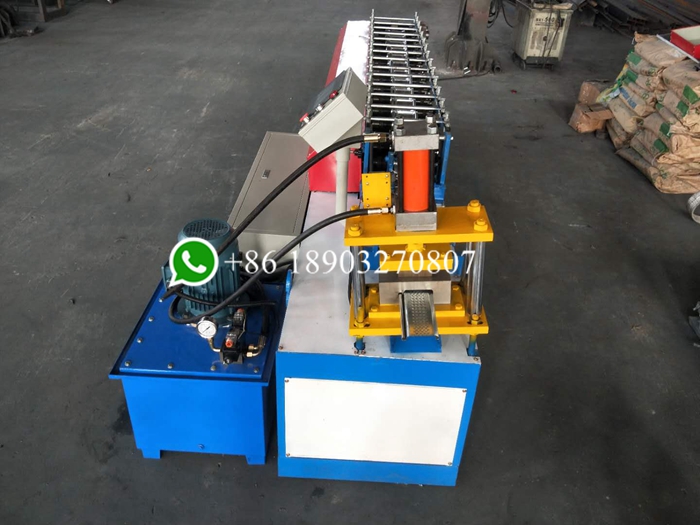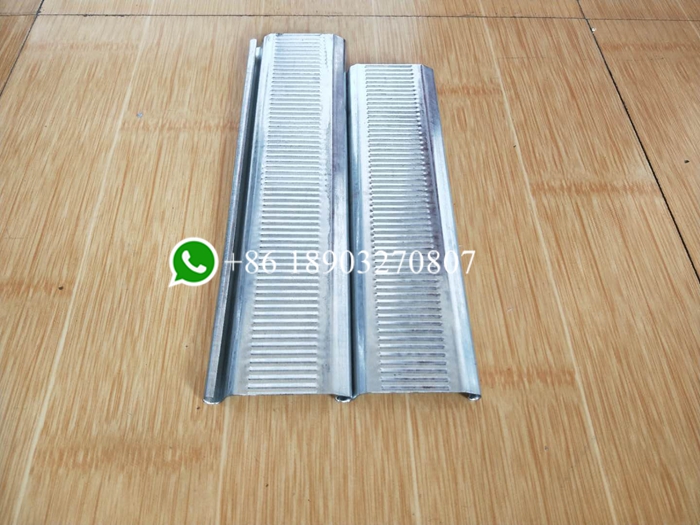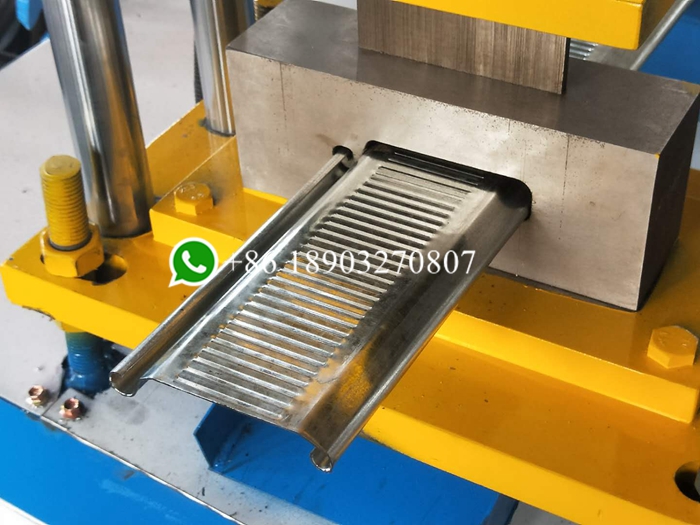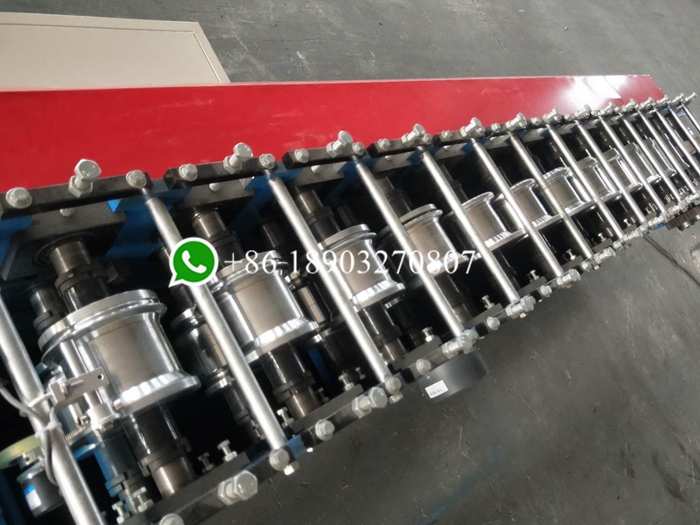Precision Garage Door Rolling Shutter Machine | Custom Solutions
Advancing Garage Door Production: An Overview of Roll Forming Technology
In the modern manufacturing landscape, precision and efficiency are paramount. The production of high-quality garage doors relies heavily on sophisticated machinery capable of consistently forming robust and aesthetically pleasing panels. The Garage door rolling shutter machine stands as a cornerstone in this industry, representing the pinnacle of automated profile shaping. This advanced equipment transforms flat metal coils into complex profiles, essential for the structural integrity and functional performance of garage doors, including rolling shutters, sectional doors, and industrial overhead doors. Our focus is on the intricate engineering, operational advantages, and strategic implications of integrating such specialized roll forming solutions into contemporary production lines.
Current Industry Trends and Market Dynamics
The global garage door market is experiencing steady growth, driven by increasing construction activities, urbanization, and a rising demand for automated and aesthetically pleasing building solutions. Key trends influencing the demand for a reliable Garage door rolling shutter machine include:
- Automation and Smart Integration: Manufacturers are increasingly seeking machines with advanced PLC controls, touch screen interfaces, and integration capabilities for smart factory environments (Industry 4.0), enabling remote monitoring and predictive maintenance.
- Material Versatility: A growing demand for machines capable of processing diverse materials, including galvanized steel, pre-painted steel, aluminum, and even specialized alloys, to meet varying aesthetic and performance requirements.
- Energy Efficiency and Sustainability: Focus on producing insulated door panels that contribute to building energy efficiency, necessitating precise forming capabilities for multi-layered profiles. The machines themselves are also designed for lower power consumption.
- Customization and Flexibility: The market demands greater flexibility to produce various door panel designs, sizes, and profiles on a single machine, reducing downtime for tooling changes.
- Enhanced Safety Features: Strict adherence to international safety standards (e.g., CE, OSHA) for machine operation and product output, requiring robust safety interlocks and protective mechanisms.
According to recent market analyses, the global industrial and garage door market is projected to reach USD 17.5 billion by 2027, growing at a CAGR of 4.5% from 2022. This upward trajectory underscores the critical need for advanced and reliable manufacturing solutions like the Garage door rolling shutter machine.

Precision engineering for automated garage door panel production.
Manufacturing Process of the Garage Door Rolling Shutter Machine
The production of a high-performance Garage door rolling shutter machine itself is a complex process demanding precision engineering and adherence to stringent quality control standards. It involves several critical stages to ensure the final product delivers long-term reliability and accuracy.
Key Manufacturing Steps:
- Material Sourcing and Preparation: High-grade structural steel (e.g., Q235, Q345) is selected for the machine's main frame, ensuring rigidity and vibration damping. Tooling components (rollers, dies) are typically crafted from specialized alloy steels like GCr15 or Cr12MoV, heat-treated for superior hardness and wear resistance (HRC 58-62). Shafts are often made from 45# steel, precision-ground and chromed.
- Frame Fabrication (Welding & Machining): The machine's base and side panels are precision-cut using CNC laser or plasma cutting, followed by robust welding (e.g., CO2 shielded welding) to form a stable framework. Post-welding, critical mounting surfaces are stress-relieved and then precisely planed or milled via large-scale CNC machining centers to achieve flatness and perpendicularity within tight tolerances (e.g., ±0.05 mm over 2 meters).
- Roller and Tooling Manufacturing: This is a highly specialized step. Rollers are designed using advanced roll forming software (e.g., COPRA) to ensure optimal profile progression. They are then CNC-machined from hardened steel blanks, often followed by wire EDM for intricate profiles. Heat treatment (quenching and tempering) ensures durability, while hard chroming or nitriding enhances surface hardness and corrosion resistance.
- Component Integration: Precision bearings, gearboxes, motors, hydraulic systems, and electrical components (PLCs, sensors, HMI) are assembled. Each component undergoes individual quality checks prior to integration. Electrical wiring adheres to international standards (e.g., IEC).
- Alignment and Calibration: Post-assembly, the machine undergoes meticulous alignment of roller stations, ensuring coaxiality and precise horizontal/vertical positioning. Laser alignment tools are commonly used to achieve optimal forming accuracy. Calibration of speed, cutting length, and hydraulic pressures is also performed.
-
Testing and Quality Assurance:
- Material Testing: Incoming raw materials are tested for chemical composition and mechanical properties (tensile strength, yield strength, hardness).
- Component Testing: Motors, hydraulic pumps, and electrical modules are tested against their specifications.
- Operational Testing: The machine runs at various speeds and loads, processing sample materials to verify profile accuracy, cutting precision, and overall stability. This includes testing against ISO 9001 quality management standards and relevant ANSI/CE machinery directives.
- Service Life Expectancy: Designed for an operational service life of 15-20 years with proper maintenance, leveraging robust component selection and manufacturing processes.
- Surface Treatment and Finishing: Components undergo sandblasting, priming, and industrial-grade paint application for corrosion resistance and aesthetic appeal.
Target industries for the manufactured components of such machines often include heavy machinery, automotive, and general fabrication, ensuring the highest standards of durability and performance. Advantages include exceptional mechanical robustness, resistance to operational wear, and minimal deflection under load.

The sophisticated control panel ensures precise operation and monitoring.
Technical Specifications and Parameters
The performance of a Garage door rolling shutter machine is defined by its core technical specifications, which dictate its capabilities, efficiency, and the quality of its output. Below is a detailed table outlining typical parameters for an advanced roll forming system.
| Parameter | Specification / Value |
|---|---|
| Machine Type | Fully Automatic PLC Controlled Cold Roll Forming Machine |
| Forming Speed | 8-15 m/min (adjustable, includes cutting) |
| Material Thickness | 0.6 - 1.2 mm (Galvanized Steel, Pre-painted Steel, Aluminum) |
| Material Width (Max) | 1250 mm |
| Number of Forming Stations | 16-24 stations (profile dependent) |
| Roller Material | Cr12MoV quenched & tempered, HRC 58-62, precision ground, hard chrome plated |
| Shaft Material | 45# Steel, precision machined, heat treated |
| Main Motor Power | 11 kW (varies with profile complexity) |
| Hydraulic Power | 7.5 kW for cutting and post-forming operations |
| Cutting Type | Hydraulic Post-Cut or Pre-Cut (profile dependent) |
| Cutting Blade Material | Cr12 with heat treatment (HRC 58-62) |
| Control System | PLC Control (e.g., Siemens, Panasonic), Touch Screen HMI |
| Length Accuracy | ±1.0 mm for 6 meters |
| Power Supply | 380V, 50Hz, 3-Phase (customizable) |
| Machine Dimensions (Approx.) | L 9500mm x W 1500mm x H 1600mm |
| Machine Weight (Approx.) | 7500 kg |
| Certifications | CE, ISO 9001 |
Application Scenarios for Garage Door Rolling Shutter Machines
The versatility of the Garage door rolling shutter machine extends across a broad spectrum of industrial and commercial applications, driven by the need for robust, secure, and energy-efficient access solutions.
- Residential Garage Doors: Production of insulated and non-insulated sectional garage door panels, aesthetic decorative profiles, and classic rolling shutter slats for homes. The ability to produce various panel widths and designs allows for customization to architectural styles.
- Commercial and Industrial Rolling Shutters: Manufacturing heavy-duty rolling shutter profiles used in warehouses, factories, retail outlets, and loading docks. These often require higher gauge materials and more robust interlocks, which the machine is engineered to handle.
- High-Speed Industrial Doors: Forming specialized profiles for rapid-roll doors, crucial in environments requiring quick access and environmental control, such as food processing plants or cleanrooms.
- Security Doors and Grilles: Producing security grille profiles for retail security or institutional buildings, where robust metal fabrication is essential for theft deterrence.
- Insulated Panel Production: Critically, these machines can be integrated into production lines for forming insulated panels, where two metal sheets are formed with precision to encapsulate a polyurethane or polystyrene core, providing significant energy-saving benefits for the end-user. This contributes to better thermal regulation and reduced heating/cooling costs, aligning with modern green building standards.
- Corrosion-Resistant Solutions: For applications in corrosive environments, such as coastal regions or chemical processing facilities, the machine can process pre-treated or stainless steel coils, ensuring the longevity and corrosion resistance of the finished garage door components.
Technical Advantages and Performance Enhancements
Investing in a high-quality Garage door rolling shutter machine provides numerous technical advantages that translate directly into operational efficiency, product quality, and competitive edge.
- High Precision Forming: Advanced roll tooling designs and CNC machining of rollers ensure consistent profile accuracy, minimizing material waste and ensuring perfect panel fitment. Tolerances often held within ±0.5mm over a 3-meter panel length.
- Automated Production Efficiency: Fully integrated PLC control systems manage the entire process from decoiling to cutting, enabling continuous, high-volume production with minimal manual intervention. This boosts throughput and reduces labor costs.
- Material Optimization: Precise length cutting and efficient nesting algorithms (when integrated with upstream ERP systems) reduce scrap rates, leading to significant material cost savings.
- Robust Construction for Longevity: Heavy-duty main frame, hardened and ground shafts, and superior quality roller materials ensure extended operational life and consistent performance even under rigorous, continuous use.
- User-Friendly Operation: Intuitive HMI touch screens simplify parameter setting, job management, and troubleshooting, reducing the learning curve for operators.
- Reduced Maintenance: Self-lubricating components, robust bearing systems, and easy access points for maintenance contribute to lower operational expenditure and higher uptime.
- Versatility in Profiles: Many modern machines offer quick-change tooling options, allowing manufacturers to produce different garage door profiles (e.g., residential sectional, industrial rolling shutter, insulated panels) with minimal downtime.

The robust structure ensures stability and long-term performance.
Vendor Comparison: Selecting the Right Partner
Choosing the right supplier for a Garage door rolling shutter machine is a strategic decision that impacts long-term operational success. A comprehensive evaluation of various vendors based on key criteria is crucial.
| Feature/Service | Leading Manufacturer (e.g., LW Roll Forming) | Other Established Vendors | Budget/Emerging Vendors |
|---|---|---|---|
| Experience & Specialization | 15+ years in roll forming, B2B focus on garage door lines. Strong R&D. | 10-15 years, broader machine range, less specialization in garage doors. | Less than 10 years, new to market, limited specialized knowledge. |
| Machine Quality & Durability | Premium components (Siemens PLC, Cr12MoV rollers), robust frame. CE/ISO certified. | Good quality components, some regional parts. Often CE/ISO. | Cost-optimized components, variable quality. May lack full certifications. |
| Customization Capability | Extensive. Tailored profiles, speed, automation level, full line integration. | Moderate. Some profile adjustments, limited full line integration. | Minimal. Standard models only, limited modifications. |
| After-Sales Support & Warranty | Global network, 24/7 technical support, 1-2 year full warranty, rapid parts. | Regional support, standard business hours, 1-year warranty, slower parts. | Limited remote support, often only 6-month warranty, difficult parts sourcing. |
| Installation & Training | On-site installation & comprehensive operator/maintenance training included. | Often remote guidance, on-site optional at extra cost. | DIY installation or basic video guides. |
| Pricing Model | Premium investment, justified by long-term ROI, reliability, and support. | Mid-range, balance of features and cost. | Lowest initial cost, often higher total cost of ownership (TCO) due to issues. |
Partnering with an experienced manufacturer like LW Roll Forming ensures not only a superior Garage door rolling shutter machine but also comprehensive support throughout its lifecycle, mitigating risks and maximizing return on investment. Our long-standing commitment to quality and customer satisfaction, evidenced by our ISO 9001 certification and extensive client portfolio across various industries, positions us as an authoritative choice.
Customized Solutions
Recognizing that every production requirement is unique, leading manufacturers offer bespoke solutions for the Garage door rolling shutter machine. This customization can involve:
- Profile Design and Tooling: Development of entirely new roller profiles to match specific architectural designs or functional requirements, including specialized interlocking systems for enhanced security or insulation.
- Material Handling Systems: Integration with automatic decoilers, stackers, or robotic handling systems for a fully automated production line, tailored to plant layout and production volume.
- In-line Punching and Notching: Custom punching units for ventilation holes, window cutouts, or hardware mounting points, eliminating secondary processing and improving efficiency.
- Advanced Control Systems: Bespoke PLC programming for unique operational sequences, integration with existing factory ERP/MES systems, or advanced diagnostics and remote access capabilities.
- Speed and Capacity Scaling: Machines can be designed for ultra-high-speed production for large manufacturers or scaled down for smaller operations, optimizing investment.
- Safety and Compliance: Customization to meet specific regional safety standards (e.g., UL for North America, GOST for Russia) or incorporating advanced safety features beyond standard requirements.
Our engineering team collaborates closely with clients to understand their precise needs, ensuring the delivered machine is a perfect fit for their current and future production goals.
Application Case Studies
Case Study 1: Large-Scale Industrial Door Manufacturer
A prominent industrial door manufacturer in Europe faced challenges with inconsistent panel profiles and slow production rates using their aging equipment. They sought a solution to produce heavy-gauge steel rolling shutter slats and insulated panels with higher precision and speed.
- Solution Provided: We supplied a heavy-duty Garage door rolling shutter machine equipped with 24 forming stations, a hydraulic post-cutting system, and an integrated auto-stacker. The machine was designed to handle galvanized steel up to 1.2mm thickness and featured quick-change roller cassettes for switching between two different industrial shutter profiles. The control system was integrated with their existing factory MES.
- Results Achieved: Production speed increased by 40%, while scrap rates were reduced by 15% due to improved length accuracy (±0.8mm). The client reported "significantly higher consistency in panel interlocks and reduced assembly time." The machine's robust construction allowed for continuous 24/7 operation, improving overall plant output and efficiency.
- Customer Feedback: "The new machine from LW Roll Forming has transformed our production line. The quality of our industrial shutters has noticeably improved, and our operational costs have decreased. Their technical support during installation and commissioning was exceptional." - Production Manager, Industrial Door Co.
Case Study 2: Residential Garage Door OEM in North America
A North American OEM specializing in premium residential garage doors required a machine capable of producing various aesthetically complex sectional door panel profiles from pre-painted aluminum and steel coils, demanding impeccable surface finish and precise decorative features.
- Solution Provided: We engineered a specialized Garage door rolling shutter machine with polished Cr12MoV rollers and a non-marking entry guide system to protect delicate pre-painted surfaces. The machine incorporated a multi-stage forming process (20 stations) to achieve intricate decorative grooves and precise panel edges without material distortion. An advanced servo-driven flying shear ensured clean, distortion-free cuts.
- Results Achieved: The client successfully launched three new garage door panel designs, gaining significant market share in the premium segment. Surface scratch defects were virtually eliminated, leading to a 20% reduction in rejection rates. The precise forming allowed for seamless integration into their automated assembly line.
- Service Case Details: During initial setup, our engineers conducted a week-long on-site training, fine-tuning the machine for specific material types and conducting comprehensive maintenance workshops for the client's team. Remote diagnostics tools were also implemented for ongoing support.

Robust machine architecture for industrial-scale operations.
Frequently Asked Questions (FAQ)
- Q: What types of materials can the Garage door rolling shutter machine process?
- A: Our machines are designed to process a wide range of materials including galvanized steel, pre-painted steel, aluminum, and sometimes stainless steel, typically ranging in thickness from 0.6mm to 1.2mm depending on the specific model and desired profile.
- Q: How long does it take to get a customized machine delivered?
- A: The lead time for a customized Garage door rolling shutter machine typically ranges from 60 to 120 working days, depending on the complexity of the design, tooling requirements, and current production schedule. Standard models have shorter lead times. We provide detailed lead time estimates upon project confirmation.
- Q: What kind of warranty is offered with the machine?
- A: We provide a comprehensive 1-year warranty on all mechanical and electrical components, excluding normal wear and tear parts like cutting blades. Extended warranty options are available. Our commitment is to ensure your long-term operational success.
- Q: What support is available for installation and training?
- A: We offer on-site installation and commissioning services by our experienced engineers. Comprehensive training for your operators and maintenance staff is also provided to ensure they are proficient in machine operation, troubleshooting, and routine maintenance procedures. Remote support is available post-installation.
Lead Time & Fulfillment
Our streamlined manufacturing processes and efficient supply chain management enable us to deliver high-quality roll forming machines within competitive timeframes.
- Standard Models: Typically 45-60 working days from deposit receipt to factory acceptance testing (FAT).
- Customized Solutions: Ranging from 60-120 working days, depending on the complexity of tooling, integration requirements, and unique specifications.
- Fulfillment Process: Includes rigorous in-house quality control checks, Factory Acceptance Testing (FAT) with client representatives (or via video conference), professional packing for international shipping, and coordination of logistics to the client's port of choice.
Warranty Commitments
We stand behind the quality and reliability of our Garage door rolling shutter machine with robust warranty provisions:
- Standard Warranty: 12 months from the date of final commissioning or 18 months from the date of shipment, whichever comes first, covering manufacturing defects in mechanical and electrical components.
- Exclusions: Consumable parts (e.g., cutting blades, sensors after a specified operational period) and damage due to improper operation, maintenance, or force majeure events.
- Support During Warranty: Free replacement of faulty components (excluding shipping costs) and remote technical support for troubleshooting. On-site engineer visits can be arranged if necessary, with costs discussed based on the nature of the issue.
Customer Support
Our commitment to our clients extends far beyond the point of sale. We provide comprehensive after-sales support to ensure optimal machine performance throughout its operational life.
- 24/7 Technical Assistance: Our dedicated support team is available via phone, email, and video conferencing to address any operational or technical inquiries promptly.
- Spare Parts Availability: We maintain a comprehensive inventory of genuine spare parts, ensuring quick dispatch to minimize downtime. Critical components can often be expedited globally.
- On-site Service: For complex issues or scheduled maintenance, our expert engineers are available for on-site visits anywhere in the world.
- Preventative Maintenance Programs: We offer tailored service contracts, including routine inspections and preventative maintenance, to maximize machine longevity and performance.
- Documentation and Resources: Each machine comes with a comprehensive operating manual, electrical diagrams, and maintenance guides. Online resources and video tutorials are also available.
References
- Grand View Research. (2022). Industrial and Garage Doors Market Size, Share & Trends Analysis Report.
- International Organization for Standardization (ISO). ISO 9001: Quality Management Systems – Requirements.
- European Committee for Standardization (CEN). CE Marking Directives for Machinery.
- American National Standards Institute (ANSI). ANSI B11.1-2009: Safety Requirements for Mechanical Power Presses.
- Cold Roll Forming Technology: Theory and Experiment, published by CRC Press.
-
Corrugated iron roofing sheet making machine with CE, AutoNewsNov.17, 2025
-
3mm Steel C U Channel Roll Forming Machine, Heavy DutyNewsNov.17, 2025
-
Calamima Micro Ondulada corrugated roof sheet machine - CNCNewsNov.17, 2025
-
Metal Roofing Roll Former for Sale Companies - Fast, PreciseNewsNov.17, 2025
-
Drywall Steel L Angle Bar forming machine | Fast, PreciseNewsNov.17, 2025
-
Corrugated Iron Roofing Sheet Making Machine, Fast & DurableNewsNov.11, 2025
-
Corrugated Metal Roofing Machine | High-Speed, Precise, CENewsNov.11, 2025







